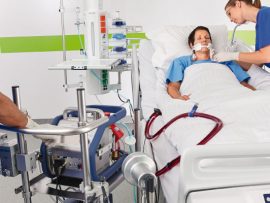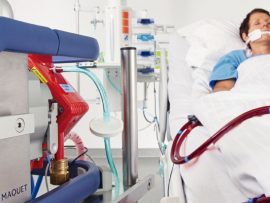Abstract BACKGROUND: Critically ill patients who receive circulatory or respiratory assist using extracorporeal membrane oxygenation (ECMO) may develop hemolysis, which can complicate the delivery of supportive care and be a..
Read MoreAbstract Microfluidic membrane oxygenators are designed to mimic branching vasculature of the native lung during extracorporeal lung support. To date, scaling of such devices to achieve clinically relevant blood flow..
Read MoreAbstract Rapid reductions in PaCO2 during extracorporeal membrane oxygenation (ECMO) are associated with poor neurologic outcomes. Understanding what factors determine PaCO2 may allow a gradual reduction, potentially improving neurologic outcome. A simple..
Read MoreAbstract Background Extracorporeal membrane oxygenation (ECMO) was frequently used to treat patients with severe coronavirus disease‑2019 (COVID‑19)‑associated acute respiratory distress (ARDS) during the initial outbreak. Care of COVID‑19 patients evolved..
Read MoreAbstract Objectives: To prospectively describe 1-year outcomes, with a focus on functional outcome, cognitive outcome, and the burden of anxiety, depression, and post-traumatic stress disorder, in coronavirus disease 2019 patients..
Read MoreAbstract Objectives: Electronic cigarette or vaping product use–associated lung injury is a clinical entity that can lead to respiratory failure and death. Despite the severity of electronic cigarette or vaping product use–associated lung injury,..
Read MoreAbstract Purpose: Among acute respiratory distress syndrome (ARDS) patients in intensive care units, the efficacy of lung recruitment maneuver (LRM) use is uncertain taking into account the most recent randomized..
Read MoreAbstract Venovenous extracorporeal membrane oxygenation (VV-ECMO) has been used as a rescue therapy for patients with refractory coronavirus disease (COVID-19)–associated severe acute respiratory distress syndrome (ARDS) with survival rates similar..
Read MoreAbstract Extracorporeal membrane oxygenation (ECMO) has been used with increasing frequency to support patients with acute respiratory failure, most commonly, and severe forms of acute respiratory distress syndrome (ARDS). The..
Read MoreAbstract In SARS-CoV-2 patients with severe acute respiratory distress syndrome (ARDS), Veno-Venous Extracorporeal Membrane Oxygenation (V-V ECMO) was shown to provide valuable treatment with reasonable survival in large multi-centre investigations...
Read MoreAbstract Background Weaning from venovenous extracorporeal membrane oxygenation (VV-ECMO) is not well studied. VV-ECMO can be discontinued when patients tolerate non-injurious mechanical ventilation (MV) during a sweep gas off trial..
Read MoreThis case reports on a 29-year-old previously healthy male patient, who was transferred from a small hospital to the Medical Intensive Care Unit (MICU) of the University Clinical Centre of..
Read MoreAbstract The role of extracorporeal membrane oxygenation (ECMO) in the management of severely ill patients with coronavirus disease 2019 (COVID-19) continues to evolve. The purpose of this study is to..
Read MoreAbstract Venous-arterial extracorporeal membrane oxygenation (VA-ECMO) treatment for acute cardiogenic shock in patients who also have acute lung injury predisposes development of a serious complication called “north-south syndrome” (NSS) which..
Read MoreAbstract Objective: To assess the safety and efficacy of combining extracorporeal CO2 removal with continuous renal replacement therapy in patients presenting with acute respiratory distress syndrome and acute kidney injury. Design: ..
Read MoreAbstract We retrospectively reviewed the medical records of 11 patients supported with a veno-venous low-flow extracorporeal carbon dioxide (CO2) removal (ECCO2R) device featuring a large gas exchange surface membrane lung..
Read MoreAbstract Background Since the 2009 pandemic influenza, we have nationally established a committee of the extracorporeal membrane oxygenation (ECMO) project. This project involves adequate respiratory management for severe respiratory failure..
Read More













